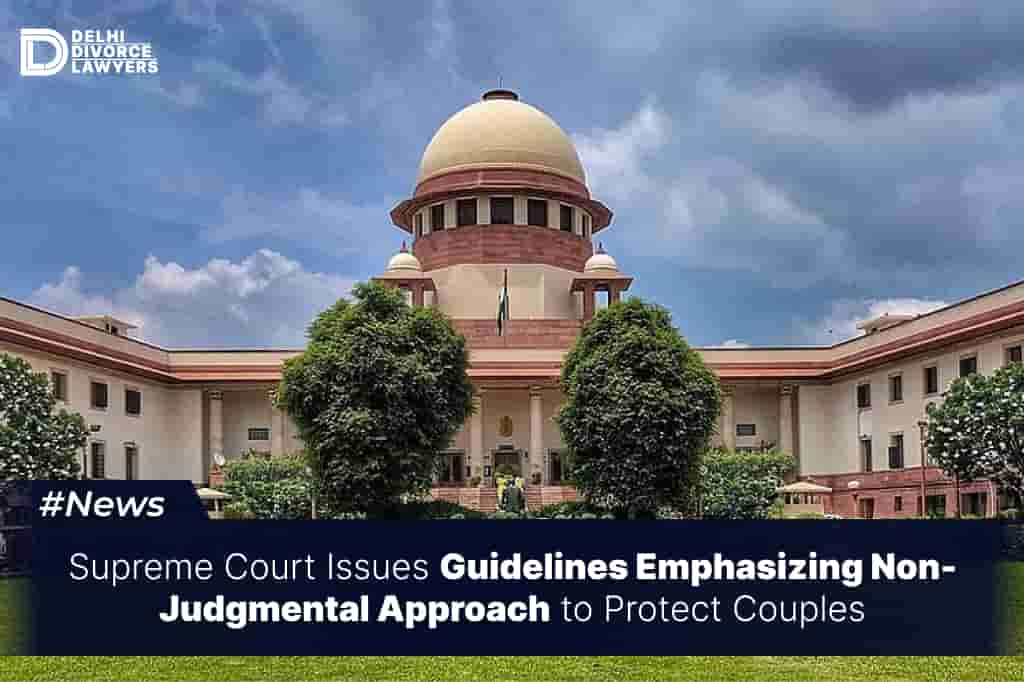Significantly, the Court said that same-sex, transgender, interfaith or inter-caste couples must be provided immediate protection before they are asked to establish the threats they face.
Recently, the Supreme Court of India issued a comprehensive set of directives aimed at guiding courts in handling petitions from couples seeking protection. Notably, in the case of Devu G Nair versus The State of Kerala & Others, the court underscored the importance of avoiding intrusive inquiries into the couples’ relationships. Chaired by Chief Justice of India (CJI) DY Chandrachud, along with Justices JB Pardiwala and Manoj Misra, the bench highlighted the mandatory nature of these guidelines, stressing their vital role in upholding the fundamental rights and dignity of intimate partners, including those from the LGBTQ+ community. Furthermore, the apex court cautioned against courts making moral judgments on such couples, emphasizing the necessity of impartiality in adjudication.
“Social morality laden with homophobic or transphobic views or any personal predilection of the judge or sympathy for the natal family must be eschewed. The court must ensure that the law is followed in ascertaining the free will of the detained or missing person,” the top court said.
The Court emphasized the urgent need to offer immediate protection to couples, irrespective of their sexual orientation, gender identity, or religious and caste backgrounds, without requiring evidence of potential threats they might encounter. Moreover, it stressed the inadmissibility of rejecting a habeas corpus petition solely based on the age of a party involved. Taking a significant stance of caution, the Court cautioned High Courts against attempting to alter an individual’s identity or sexual orientation through what it termed as mere “counselling.” This matter arose in a Habeas Corpus petition concerning the purported unlawful detention of a lesbian partner by her parents. The Supreme Court was informed that the Kerala High Court frequently recommended counselling in cases involving same-sex couples. Recognizing that counselling or parental involvement directives might deter members of the LGBTQ+ community, the Court emphasized the necessity of establishing precise guidelines for courts handling habeas corpus petitions and those seeking protection from familial or police interference.
“The importance of a chosen family is sometimes lost to the traditional assumption that the natal family is respectful of a person’s choices and freedoms. Courts must not wittingly or unwittingly become allies in this misunderstanding, more so in cases involving habeas corpus petition, petitions for protection of the person, or in missing persons’ complaints,” the top court remarked.
As a result, the Supreme Court has outlined the following directives:
- Habeas corpus petitions and protection pleas submitted by partners, friends, or relatives should be given precedence in court scheduling and hearings. The court should minimize unnecessary adjournments or delays in resolving these cases.
- The court ought to abstain from delving into the specific nature of the relationship between the petitioner and the individual when determining their legal standing.
- Efforts should be made to create an environment conducive to open and voluntary dialogue to ascertain the wishes of the individual in question.
- Ensuring the privacy and safety of the detained or missing person is of utmost importance. This involves conducting proceedings in-camera and providing opportunities for private interaction with the judges in chambers. Recordings of proceedings should be securely stored to prevent unauthorized access.
- The court must prevent any undue influence on the detained person’s wishes by the court, law enforcement, or family members. Measures should be in place to prohibit the presence of individuals allegedly detaining the person against their will during court proceedings.
- During interactions with the detained person, the court should prioritize their comfort and well-being, respecting their chosen name and pronouns, providing basic amenities, and allowing breaks as necessary. Judges should adopt a compassionate approach to alleviate any tension.
- While the court may verify the age of the detained person, minority status should not be grounds for dismissing a habeas corpus petition against illegal detention by family members.
- Judges should display empathy, avoiding personal biases or prejudices, and ensure adherence to the law while respecting the detained person’s autonomy.
- If the detained person expresses a desire not to return to their alleged captor or family, immediate release should be granted without delay.
- Recognizing the societal stigma faced by certain intimate partners, especially those in same-sex, transgender, interfaith, or inter-caste relationships, the court should provide interim police protection before establishing the threshold requirement of significant risk of violence.
- The court should refrain from issuing directives for counseling or parental involvement, instead focusing on discerning the detained person’s wishes.
- Judges must refrain from attempting to influence disclosures of sexual orientation or gender identity and promptly address any discriminatory behavior or remarks during proceedings.
- Sexual orientation and gender identity are personal matters of self-identification, and the court should refrain from passing judgment or making derogatory comments in cases involving LGBTQ+ individuals.

